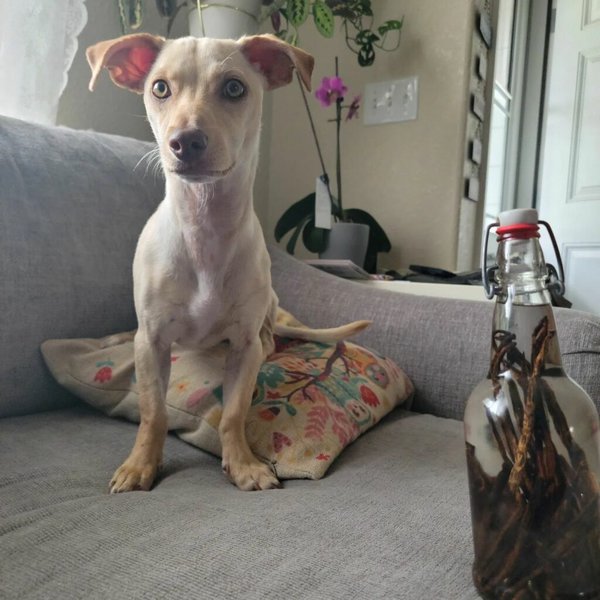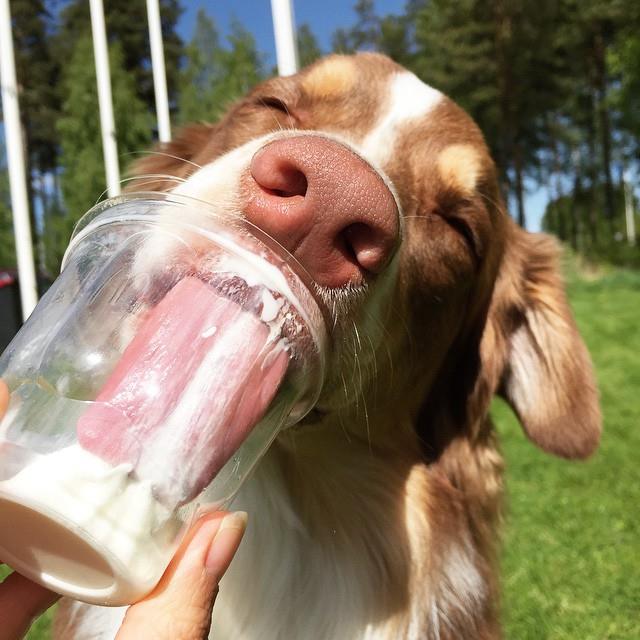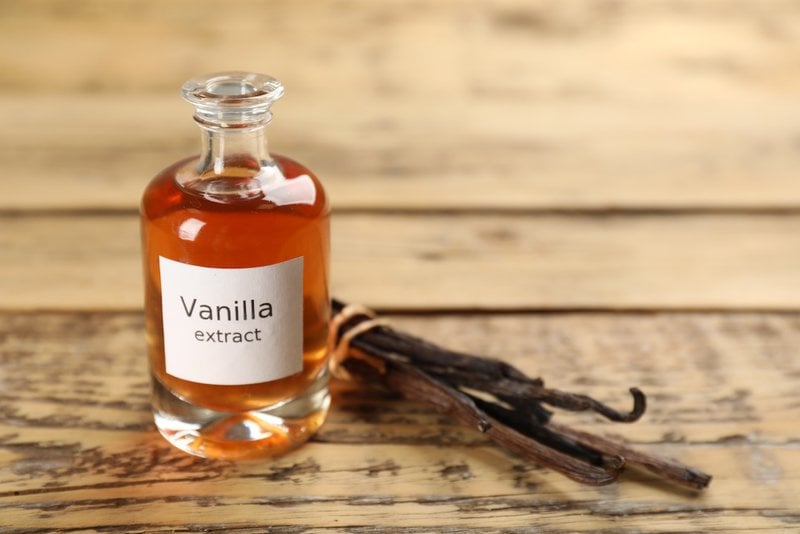Your dog may have snuck a lick or two of vanilla extract after catching a whiff of its sweet scent. After all, if we like sweets so much, why wouldn’t dogs like them too? But you may be wondering if the vanilla extract is safe for doggies. Can dogs have vanilla extract?
Dogs cannot have vanilla extract because it is incredibly potent and may upset your dog’s stomach. Your pup could experience vomiting, diarrhea, or even go into a coma after ingesting a significant amount of vanilla extract. Your furry friend could also become lethargic and have trouble walking.
So, it’s essential to keep vanilla flavoring away from your pup. To help you take care of your pup, we discuss what to do if your dog consumes vanilla extract and how to recognize dangerous symptoms. We also review other foods that contain vanilla and whether they’re safe for your canine buddy. But first, let’s go into the details of why vanilla isn’t safe for doggies!
Can Dogs Have Vanilla?

No, dogs cannot have vanilla because it is dangerous for dogs’ stomachs. Vanilla bean extract contains ethanol, an alcohol that is toxic to dogs when they consume it in large quantities.
Small amounts of ethanol can cause vomiting and diarrhea, but more significant amounts can lead to severe problems. In addition to ethanol, vanilla also contains vanillin, a chemical toxic to dogs in large doses.
Vanillin can cause gastrointestinal upset and vomiting in dogs or harm their kidneys and liver. In severe cases, vanillin toxicity can even lead to death.
Should Your Dog Avoid Vanilla?
Potential health risks and fatality are the main reasons you should avoid vanilla.
Due to these reasons, consider not feeding your dog vanilla or anything that contains aromatic compounds and alcohol. Let’s take a closer look at these reasons.
Potential Health Concerns
The most important reason to keep your dog away from vanilla is because of potential health concerns. Since vanilla is generally considered harmful, it’s best to err on the side of caution. Vanilla intake can cause liver and kidney damage and gastrointestinal upset. It can also irritate a dog’s skin and eyes.
Another concern about feeding your dog vanilla is that it contains alcohol. Even small amounts of alcohol can lead to liver damage and pancreatitis in dogs, so it’s best to avoid feeding them any alcohol.
Moreover, many commercial vanilla products also contain sugar, which is harmful to dogs. Too much sugar can lead to weight gain, diabetes, and other health problems.
Can Be Fatal
You might not think something as innocuous as vanilla extract could be fatal to your pup, but it can be. The potential health problems associated with vanilla extract are numerous and can vary; in some cases, the consequences can be deadly.
One of the most significant potential health concerns associated with vanilla extract is that it contains a chemical called vanillin. Vanillin is a known carcinogen that can potentially cause cancer. In addition, vanillin is also a neurotoxin that can damage your dog’s nervous system.
What Should I Do If My Dog Eats Vanilla?
If your dog ingests vanilla, the first thing you should do is call or visit your veterinarian.
Your vet will likely want to see your dog immediately to assess the situation and determine the best course of treatment. They may sometimes recommend bringing your dog to the emergency clinic if they feel it is warranted.
If your dog’s blood sugar levels become elevated after consuming vanilla, your veterinarian may recommend giving your canine insulin injections. It’s essential to monitor your dog closely and seek veterinary care if you notice any signs of illness.
Do the following things if your dog has eaten vanilla:
Identify If Your Pup Has Eaten Vanilla
The first thing you’ll want to do is figure out how much vanilla your dog ate. If your furry friend only licked a small bowl clean, chances are they consumed a small amount of vanilla, not vice versa.
In addition, check for changes in your pup’s behavior or appearance. If your pup seems lethargic or is vomiting, it may have ingested vanilla.
Vanilla Poisoning Symptoms In Dogs
After your pup has eaten vanilla, keep an eye out for any signs that they’re not feeling well. If you notice any of the following, contact your vet right away:
- Diarrhea
- Vomiting
- Lethargy or fatigue
- Loss of appetite
- Abnormal behavior
These are all signs that your dog may be suffering from vanilla poisoning. If you notice any of these symptoms, try the following:

Induce Vomiting
If your dog eats a large quantity of vanilla extract, you might need to make your pup vomit. It helps to eliminate any vanilla still in your dog’s system. To do this, give your dog 3% hydrogen peroxide according to its weight. For example, if your dog weighs 10 lbs, you would give one teaspoon of hydrogen peroxide.
Once you have given your dog hydrogen peroxide, wait 15 to 45 minutes to see if your pup vomits. If your dog doesn’t, you can provide another dose.
Go To A Vet
If you can’t get your dog to vomit or your doggie is already showing signs of illness, it’s essential to take them to a vet immediately. They may need to be given IV fluids or have their stomach pumped. In severe cases, dogs may need to be hospitalized for a few days to be monitored.
Take Precautions
To prevent your dog from eating vanilla in the future, ensure that you store containers of vanilla extract or flavoring out of your dog’s reach. In addition, be careful when using vanilla extract or flavorings around your dog, as they may be tempted to lick it off your skin or clothes.
Finally, if you use vanilla extract or flavorings in your baking or cooking, wash your hands thoroughly afterward to remove any residue. Taking these precautions can help ensure that your pup doesn’t accidentally eat vanilla and become sick.
By following the steps above, you can help to prevent your dog from falling ill. And, if they do become sick, you can get them the treatment they need to make a full recovery.
Do Dogs Love Vanilla?
Thanks to their incredible sense of smell, dogs absolutely love food that smells good. So, it’s no surprise that they love vanilla.
Many dogs enjoy the scent of vanilla. In fact, some scents can be pleasant to canines because of their effect on the limbic system, which is responsible for a dog’s emotions. The limbic system is also responsible for a dog’s sense of smell, so it makes sense that certain smells would trigger positive emotions in dogs.
Vanilla is one of those smells, and it’s often used in dog-friendly products like shampoo and air fresheners. If you want to make your home more welcoming for your furry friend, try adding a bit of vanilla to the mix!
Can Dogs Eat Vanilla Ice Cream?
Yes, dogs can eat small amounts of low-fat vanilla ice cream! Many dog owners enjoy giving their furry friends a little taste of this sweet treat from time to time. However, it’s essential to keep a few things in mind when feeding your dog ice cream.
First, it’s essential to choose an ice cream specifically for dogs. These products usually don’t contain chocolate or artificial sweeteners that could harm pups.
It’s best to give your dog a small amount of ice cream first to see how they react. Some dogs may be sensitive to cold temperatures and get an upset stomach. Moreover, the milk in ice cream can cause bloating if your doggie eats too much. You can enjoy sharing a taste of this delicious treat with your pup, but don’t overdo it.
Can Dogs Eat Vanilla Yogurt?

Yes, dogs can eat vanilla yogurt. However, choosing a yogurt without artificial sweeteners is crucial, as these can be toxic to dogs. Some yogurts also contain fruit juices or other ingredients that may not be safe for dogs.
Ensure the yogurt you select has no added fruit chunks or other ingredients that could pose a choking hazard. Always give your dog yogurt in moderation and monitor their stool for any changes, as some dogs may be lactose intolerant. If you notice any adverse effects, stop feeding them yogurt and consult your veterinarian.
Can Dogs Have Homemade Vanilla Extract?
As long as the homemade vanilla extract is made with dog-safe ingredients, it should be fine for them to consume. However, making an utterly sugar-free vanilla extract is impossible, and any homemade version will thus contain some sugar.
Therefore, it’s best to avoid giving your dog too much homemade vanilla extract. It could lead to weight gain or other health problems. If you decide to give your dog homemade vanilla extract, make sure only to use a small amount and monitor your canine buddy closely for any adverse reactions.





